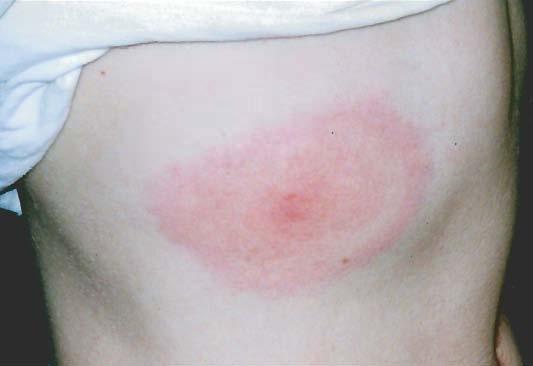Lyme time
Here's one of what I'm sure will be many posts on Lyme Disease.
I live in the state where infection with the bacteria Borrelia Burgdorferi (borreliosis) got it's more common name - Lyme Disease. According to the state's public health website, "the percentage of deer ticks carrying B. burgdorferi can reach 23% in some areas" of this state.
Therefore, Lyme is part of my environment, both biologically and socially. Since getting Lyme in 2002, I do tick checks whenever I've spent time outside or when I've spent time around pets who go outside. The tick checks are just part of how my life has changed since I contracted Lyme Disease, but they are the most obvious sign. Some people think I obsess. These are people who have never had Lyme Disease.
I know a lot of people who have or had Lyme Disease. The stats say I also know a lot of people who will have Lyme Disease. My experiences in this Lyme Disease saturated area indicate that public education and provider education need to be stepped up a bit. But there are barriers to any Lyme education and awareness campaign. The most notable is resistance fueled by already in place misinformation. Attitudes based on conclusions drawn not as much from experience or science but from poorly phrased facts, over-generalizations, over-reactions, under-reactions, and what amounts to professional gossip.
Lyme is a quite unfortunate illness, not just because it totally sucks physically. What makes it so unfortunate is the misinformation I spoke of. This misinformation is both a product of and a source for the "Lyme Controversy" (insert ominous music here if you have a sense of humor).
The controversy has arisen among and divided both patient advocacy groups and health care providers. Variety in approach to research can be good for scientific progress. E.g., good things can come out of a little good natured rivalry between research teams perhaps and a healthy peer review process which includes diverse views and perspectives. But the sides on the Lyme controversy are not good natured about each other's views. There's nothing healthy about the relationship here. It's downright contentious.
Once a thing becomes so controversial, views of the sides tend to get further and further away from each other. It's that whole "in group/out group" thing I think. One unfortunate outcome for patients with Lyme Disease (or sick people suspected of having Lyme) is that a common set of good, empirically based clinical practices has become increasingly hard to find. In its place, you too often find practices and presentations colored by prejudice, provider-patient relationships marred with contention due to sometime passionately unyielding preconceptions. Such encounters reinforce the divisions between the sides. They get passed on through word of mouth, perpetuating the cycle of distrust and adding ever increasing layers of generalized vilification of members of "the other side".
In short, once a controversy arises, people start acting silly. And Lyme is nothing to be silly about.
An example of what I mean when I say "silly" is when a doctor who sees you years after you had a diagnosis of Lyme Disease questions the validity of the diagnosis because he believes Lyme is an overdiagnosed illness. "I don't believe in chronic Lyme" a doctor once told me. "What?" I never said "chronic Lyme". I never even hinted at it. I just said I had had a Lyme diagnosis 6 months earlier and was still feeling crappy most of the time.
Silly is also when a friend or colleague sends you all sorts of alarming information saying oral antibiotics never work and insists that one can only be adequately treated by taking a year of IV antibiotics, undergoing hyperbaric treatments, and all but stalking some unfortunate local infectious disease doctor. "Otherwise you could DIE!!!! It eats your brain!!!! It's eating your brain RIGHT NOW!!!!" (Ok, I'm exaggerating on this last bit, but truly only very slightly)
A case of Lyme or suspected Lyme is even more unfortunate when it happens to someone who already has existing medical problems. Pre-existing medical problems add another layer of difficulty to a situation which is already potentially nasty enough.
Which brings me to the point of my post. A good friend who already has some pretty significant health problems has a bite, a rash, and is having symptoms of Lyme. In talking to her, I gave her some peer-based (i.e. non-medical) advice which I want to share. I don't presume to know the best plan of action for any particular individual who suspects that they may have Lyme Disease, other than to seek medical attention. How to proceed is up to you and your doctor(s). But here's my one small piece of peer-based, non-medical advice for anyone who thinks they might have Lyme.
If you have a rash, TAKE PICTURES OF IT. Get copies, and keep them with your medical records. Give one to your primary, keep one (at least) at home.
I found it to be useful. I had a low positive ELISA, a positive (for diagnostic standards) western blot (IgG and IgM bands), and a borderline spinal tap. And still, I have run into doctors who were skeptical that I ever had Lyme. Then I show my stunning Lyme rash picture and the skepticism melts away, replaced by statements like "Yep, that's Lyme".
It's been my experience as a patient that doubt of a prior diagnosis can get in the way of adequate assessment and treatment, not just for the Lyme Disease but for later medical conditions.
Here's a copy of my stunning lyme rash - more technically called an "erythema migrans" or "EM" rash.
There are (at least) two small very dark marks which I think are picture scan artifacts
(one mark is at just after 12 o'clock near the inner portion of the rim, the other is on my abdomen outside the rash border but at about 2ish relative to the rash)
I think the technical term is "scanner schumutz"





No comments:
Post a Comment